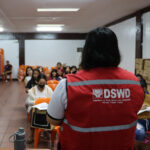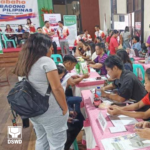In observance of the National Women’s Month this March, the Department of Social Welfare and Development (DSWD) renewed its call to the public to report cases of violence against women and children (VAWC), gender-based violence (GBV), and other forms of abuse that they may have witnesses or experienced within their homes and communities.
“Women should never feel alone in their struggle against abuse, and they should know that they have the right to live a life free from violence. We encourage women to reach out, report cases of violence, and access the services available to them because VAWC is a crime,” DSWD spokesperson Assistant Secretary Irene Dumlao said on Wednesday (March 5).
The public may report cases of VAWC to the Philippine National Police (PNP), National Bureau of Investigation (NBI), Public Attorney\’s Office (PAO), Council for the Welfare of Children (CWC) Makabata Helpline, and to the nearest Barangay VAW Desk in their areas.
In 2024, a total of 1,069 victim-survivors of VAWC and other forms of abuse against women were reported and served by the DSWD nationwide through its community-based programs and services.
“The fight against violence must be a collective effort, and we urge the public to stand together and break the culture of silence to better protect all women and their children,” the DSWD spokesperson pointed out.
As part of this year’s sub-theme for the National Women’s Month, “Babae sa Lahat ng Sektor, Aangat ang Bukas sa Bagong Pilipinas,” the DSWD, as the chair of the Inter-Agency Council on Violence Against Women and their Children (IACVAWC), is encouraging VAWC victim-survivors to seek assistance in gaining access to the services they need.
Asst. Secretary Dumlao said the DSWD, through its centers and residential care facilities (CRCFs), provides comprehensive social protection packages to victim-survivors of domestic violence, GBV, as well as their children and dependents.
These interventions include healing and rehabilitation; group life and home care; health and nutrition; and productivity skills training.
Other services focus on the restoration of the social functioning of VAWC victim-survivors, as well as the provision of basic needs, health services, and vocational counseling.
“We provide financial, medical, and educational assistance; psychosocial counseling: and referrals to other concerned institutions such as the PAO,” the DSWD spokesperson said.
The DSWD also provides technical assistance to local government units (LGUs) and other partners for the effective implementation of social welfare and development services as women welfare programs fall under their mandate.
“Through collective action, the DSWD aims to create safer spaces for women and ensure that the rights of every woman and child are respected, protected, and upheld,” Asst. Secretary Dumlao said.
Republic Act No. 9262 or Anti-VAWC Act of 2004, defines VAWC as “any act committed by any person against a woman who is his wife, former wife, or against a woman with whom the person has or had a sexual or dating relationship, or with whom he has a common child, or against her child whether legitimate or illegitimate, within or without the family abode, which results in or is likely to result in physical, sexual, psychological harm or suffering, or economic abuse including threats of such acts, battery, assault, coercion, harassment or arbitrary deprivation of liberty.” (YADP)


